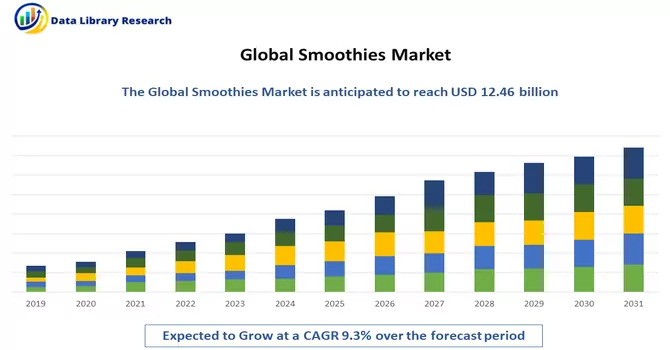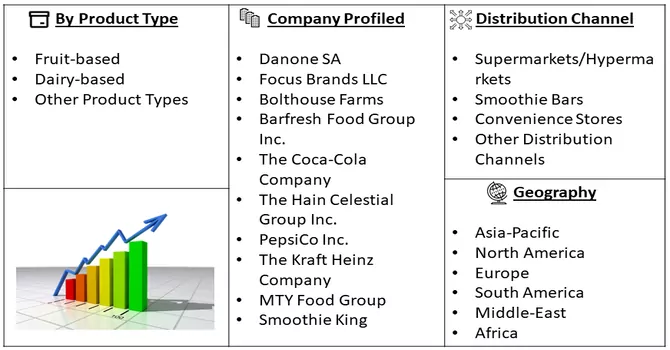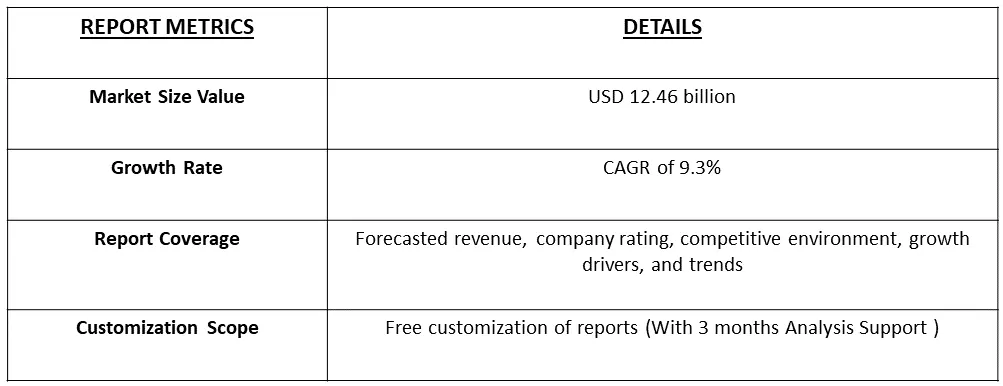The global smoothies market, valued at approximately USD 12.46 billion in 2023, is anticipated to experience a robust compound annual growth rate (CAGR) of 9.3% from 2024 to 2031.

Get Complete Analysis Of The Report - Download Free Sample PDF
Smoothies, characterized as blended beverages amalgamating diverse ingredients like fruits, vegetables, yogurt, and various liquids, offer a thick, creamy, and nutritious concoction. Not only are they flavorful, but they also present a convenient means of obtaining a spectrum of nutrients in a single serving. Customizable to individual tastes and dietary preferences, smoothies have gained popularity as a versatile option for enhancing vitamin, mineral, and fiber intake.
The market's expansion in recent years can be attributed to evolving consumer preferences, prominently driven by heightened health consciousness. Consequently, numerous companies are adapting their business models by introducing packaged versions of their popular smoothie products. Franchises are focusing on partnerships with meal delivery services and incorporating drive-through options to cater to changing consumer behavior. The heightened awareness surrounding healthy eating has resulted in the flourishing of companies offering more nutritious smoothie options. The smoothies market is poised for significant growth, propelled by shifts in food habits, changing lifestyle patterns, and a prevailing trend towards healthier living. Noteworthy trends in the global smoothies market include the incorporation of health boosters such as superfoods (e.g., acai, chia seeds), and protein, transforming traditional smoothies into functional supplements. These ingredients not only enhance the immune system but also provide a myriad of health benefits. As a result, the industry is witnessing a surge in consumer interest and adoption of smoothies as a part of a holistic approach to well-being.
The global smoothies market is witnessing impactful trends that are shaping its dynamics on a worldwide scale. A significant trend is the escalating demand for healthier and functional beverages, driving the integration of superfoods, plant-based proteins, and various nutritional enhancements into smoothie formulations. The surge in personalized nutrition has given rise to the creation of customizable smoothie options, empowering consumers to tailor ingredients according to their dietary preferences and wellness objectives. Sustainability considerations are also influencing packaging decisions, with an increasing inclination towards eco-friendly and recyclable materials. The advent of technology has played a pivotal role in expanding the smoothie market, with online platforms facilitating the availability of pre-packaged smoothies, do-it-yourself (DIY) smoothie kits, and delivery services. Moreover, the market is witnessing a trend towards unique flavor combinations, incorporating exotic fruits and herbal infusions to cater to the evolving taste preferences of consumers. The intersection of health-conscious lifestyles and convenience remains a driving force behind consumer choices, positioning the smoothies market for continuous innovation and growth.
Market Segmentation:
The Smoothies Market is segmented on the basis of Product Type (Fruit-based, Dairy-based, and Other Product Types); by Distribution Channel (Supermarkets/Hypermarkets, Smoothie Bars, Convenience Stores, and Other Distribution Channels), and by Geography (North America, Europe, Asia-Pacific, South America, and Middle East & Africa). The report offers the market size and forecasts for in terms of value (in USD million) for all the above segments.

For Detailed Market Segmentation - Download Free Sample PDF
Market Drivers:
The escalating demand for healthier beverage alternatives and the trend towards personalized nutrition
The escalating demand for healthier beverage alternatives is a prominent trend driven by increasing consumer awareness of the link between diet and well-being. As health-conscious lifestyles become a global norm, individuals seek nutritious alternatives to traditional sugary drinks. Concurrently, the trend towards personalized nutrition reflects a growing preference for tailored dietary choices. Consumers desire customizable options that cater to individual health goals, preferences, and dietary requirements. This shift signifies a broader movement towards recognizing the unique nutritional needs of individuals, fostering innovation in the food and beverage industry to meet the demands for personalized and health-enhancing beverage options.
Rising popularity of customizable options, allowing individuals to tailor their smoothies to specific dietary preferences and wellness goals.
The rising popularity of customizable options in the smoothie market signifies a consumer-driven shift towards personalized nutrition. Individuals now seek the ability to tailor their smoothies to specific dietary preferences and wellness goals, reflecting a desire for flexibility and control over their nutritional intake. This trend has led to a surge in offerings that accommodate various dietary requirements, whether focused on plant-based ingredients, protein enrichment, or specific nutritional benefits. As a result, the smoothie market embraces innovation, responding to the diverse needs of consumers who prioritize not only taste but also the alignment of their beverage choices with individual health and wellness objectives.
Market Restraints:
The potential impact of supply chain disruptions
The potential impact of supply chain disruptions stands as a notable challenge that could impede the growth trajectory of the smoothies market. External factors, such as climate-related events, transportation constraints, or unforeseen challenges in sourcing fresh ingredients, have the potential to disrupt the smoothie production and distribution process. Such disruptions may lead to fluctuations in the availability of key components, impacting the market's ability to meet consumer demand consistently. The vulnerability of the supply chain underscores the importance of resilience and adaptability within the smoothie industry, prompting companies to strategize and implement measures to mitigate the potential adverse effects of supply chain interruptions.
The COVID-19 pandemic has presented a mixed impact on the smoothie market. Initially, as lockdowns and health concerns led consumers to prioritize immune-boosting and nutritious options, there was a surge in demand for smoothies containing fruits, vegetables, and other functional ingredients. However, the closure of dine-in options and decreased foot traffic in commercial areas, including malls and cafes, significantly affected the out-of-home consumption of smoothies. The shift towards home-based consumption and a growing focus on health and wellness continued to drive sales of pre-packaged or homemade smoothie products. Supply chain disruptions and economic uncertainties impacted the availability and pricing of certain smoothie ingredients, influencing market dynamics. Additionally, the emphasis on hygiene and safety protocols prompted changes in the way smoothies are prepared and served. The long-term impact on the smoothie market will depend on factors such as the pace of economic recovery, evolving consumer preferences, and the ability of the industry to innovate and adapt to changing market conditions post-pandemic.
Segmental Analysis:
Fruit-based Smoothies Segment is Expected to Witness Significant Growth Over the Forecast Period
Fruit-based smoothies have become a popular and refreshing beverage choice for health-conscious consumers worldwide. These delightful concoctions offer a delicious way to incorporate an array of vitamins, minerals, and antioxidants into one's diet. The versatility of fruit-based smoothies lies in the ability to blend various fruits, such as berries, bananas, mangoes, and citrus, creating a burst of flavors that caters to diverse taste preferences. Beyond their delectable taste, fruit-based smoothies are celebrated for their nutritional benefits. Packed with natural sugars, fibers, and essential nutrients, they provide a quick and convenient option for a wholesome snack or meal replacement. The inherent sweetness of fruits eliminates the need for additional sugars, making them a healthier alternative to sugary beverages. These smoothies also offer customization options, allowing individuals to tailor their blends based on dietary requirements or fitness goals. Adding yogurt, nut butters, or plant-based proteins can enhance the smoothie's creaminess and nutritional profile, making it a versatile choice for those seeking both taste and sustenance. In the ever-expanding landscape of healthy beverage options, fruit-based smoothies continue to stand out as a vibrant and nourishing choice, embodying the fusion of taste and wellness in a single, convenient sip.
Supermarkets/Hypermarkets Segment is Expected to Witness Significant Growth Over the Forecast Period
The intersection of supermarkets/hypermarkets and the smoothie market has created a symbiotic relationship that caters to the evolving consumer preferences for convenient and healthy beverage options. Supermarkets and hypermarkets play a pivotal role in the distribution and accessibility of a diverse range of smoothie products. Within these retail spaces, consumers can find an array of pre-packaged smoothies, both from established brands and emerging players. The convenience of these ready-to-drink options aligns with the fast-paced lifestyles of modern consumers, offering a quick and nutritious on-the-go solution. The supermarket/hypermarket segment provides a platform for smoothie brands to showcase their product innovations, flavors, and nutritional benefits, influencing consumer choices through strategic product placements and marketing initiatives. Moreover, supermarkets often feature dedicated sections for fresh produce, allowing consumers to handpick fruits and vegetables to create their customized smoothies at home. This DIY approach aligns with the increasing demand for personalized nutrition and allows customers to tailor their smoothie ingredients to meet specific dietary requirements or flavor preferences. The collaboration between supermarkets/hypermarkets and the smoothie market reflects a broader trend in the retail landscape, where the emphasis on health and convenience converges to meet the needs of the contemporary consumer. As these retail giants continue to expand their health and wellness offerings, the smoothie market stands to benefit, reaching a broader audience and contributing to the overall growth of this dynamic segment.
North America Region is Expected to Witness Significant Growth Over the Forecast Period
In North America, the smoothie market has witnessed significant growth and adaptation, aligning with the region's increasing focus on health and wellness. The demand for nutritious and convenient beverages has driven the popularity of smoothies, positioning them as a staple in the daily routines of many North American consumers. The region boasts a diverse market landscape with a plethora of smoothie options available in supermarkets, health food stores, and specialized smoothie bars. Major cities are witnessing a surge in smoothie-centric establishments, responding to the preferences of individuals seeking not only delicious but also health-conscious alternatives. One notable trend in North America is the emphasis on fresh, locally-sourced ingredients. Many consumers are drawn to smoothies made from a combination of locally-grown fruits and vegetables, aligning with the growing awareness of sustainability and the desire for a connection to the source of their food. In addition to the availability of ready-to-drink smoothies, North American consumers often have the opportunity to create their customized blends at smoothie bars within supermarkets or dedicated smoothie establishments. This DIY approach allows for a personalized experience, catering to individual taste preferences and dietary requirements. The North American smoothie market is also influenced by the rise of functional ingredients. Consumers are increasingly seeking smoothies enriched with superfoods, plant-based proteins, and other nutritional boosts, reflecting a broader interest in holistic well-being. Overall, the North American region showcases a dynamic and evolving landscape for the smoothie market, where convenience, health consciousness, and customization converge to meet the diverse needs of consumers.

Get Complete Analysis Of The Report - Download Free Sample PDF
The smoothie market on a global scale exhibits a high degree of fragmentation, primarily attributed to the presence of significant regional and domestic players across various countries. Leading companies within this market emphasize strategic approaches such as mergers, expansions, acquisitions, and partnerships, along with a focus on new product development, to enhance their brand visibility and appeal to consumers. The landscape is further enriched by the emergence of numerous new companies introducing their products to the market. In a competitive effort, players actively employ diverse strategies, including the design of compelling advertising campaigns, to position their products effectively and stimulate demand. This dynamic environment underscores the continuous efforts and creativity within the industry as companies vie for consumer attention and market share. Some of the market players working in this market segment are:
Recent Development:
1) In February 2022, Naked Juice, a juice and smoothies brand under PepsiCo, expanded its smoothie range by introducing new flavors, including orange vanilla crème and key lime. These plant-based smoothies are sweetened with monk fruit and crafted with a blend of almond milk and coconut milk, offering a delicious source of vitamin C.
2) In January 2022, Smoothie King unveiled a fresh lineup of Activator Recovery smoothies. Each of these three new 20-ounce smoothies boasts 26 grams of protein, 260 calories, and electrolytes to support rehydration. Combining whole fruits, organic vegetables, Smoothie King's Gladiator protein, and coconut water, these smoothies are free from added sugars, providing a nutritious and energizing option.
Q1. What was the Smoothies Market size in 2023?
As per Data Library Research he global smoothies market, valued at approximately USD 12.46 billion in 2023.
Q2. At what CAGR is the Smoothies Market projected to grow within the forecast period?
Smoothies Market is anticipated to experience a robust compound annual growth rate (CAGR) of 9.3% over the forecast period.
Q3. Which region has the largest share of the Smoothies market? What are the largest region's market size and growth rate?
North America has the largest share of the market . For detailed insights on the largest region's market size and growth rate request a sample here.
Q4. Who are the key players in Smoothies market?
Some key players operating in the market include
Data Library Research are conducted by industry experts who offer insight on industry structure, market segmentations technology assessment and competitive landscape (CL), and penetration, as well as on emerging trends. Their analysis is based on primary interviews (~ 80%) and secondary research (~ 20%) as well as years of professional expertise in their respective industries. Adding to this, by analysing historical trends and current market positions, our analysts predict where the market will be headed for the next five years. Furthermore, the varying trends of segment & categories geographically presented are also studied and the estimated based on the primary & secondary research.
In this particular report from the supply side Data Library Research has conducted primary surveys (interviews) with the key level executives (VP, CEO’s, Marketing Director, Business Development Manager and SOFT) of the companies that active & prominent as well as the midsized organization
FIGURE 1: DLR RESEARH PROCESS

Extensive primary research was conducted to gain a deeper insight of the market and industry performance. The analysis is based on both primary and secondary research as well as years of professional expertise in the respective industries.
In addition to analysing current and historical trends, our analysts predict where the market is headed over the next five years.
It varies by segment for these categories geographically presented in the list of market tables. Speaking about this particular report we have conducted primary surveys (interviews) with the key level executives (VP, CEO’s, Marketing Director, Business Development Manager and many more) of the major players active in the market.
Secondary ResearchSecondary research was mainly used to collect and identify information useful for the extensive, technical, market-oriented, and Friend’s study of the Global Extra Neutral Alcohol. It was also used to obtain key information about major players, market classification and segmentation according to the industry trends, geographical markets, and developments related to the market and technology perspectives. For this study, analysts have gathered information from various credible sources, such as annual reports, sec filings, journals, white papers, SOFT presentations, and company web sites.
Market Size EstimationBoth, top-down and bottom-up approaches were used to estimate and validate the size of the Global market and to estimate the size of various other dependent submarkets in the overall Extra Neutral Alcohol. The key players in the market were identified through secondary research and their market contributions in the respective geographies were determined through primary and secondary research.
Forecast Model
